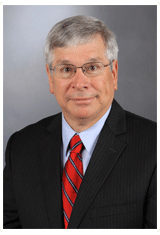Interstate 70 is the beating heart of our state’s transportation system. Built more than 50 years ago, the highway connects Missouri’s two major metropolitan areas. An estimated 31,000 vehicles drive on I-70 per day in the most rural sections. Towards the Kansas City end, the highway carries 98,000 vehicles a day, 25,000 of which are trucks. Sixty percent of the state’s entire population lives within 30 miles, north or south, of I-70. It is one of the most critical highways in our state, and it is crumbling.
Unfortunately, it’s not alone. All throughout Missouri, our roads and highways are in desperate need of repair. We have the seventh largest highway system in the nation and more miles of roadway than any of our eight bordering states. We have 213 major bridges, with more than 10,000 total throughout our state. We have more river crossings than any other state. Despite all this, though, our transportation system is dangerously underfunded.
MoDOT has made do with far less funding than they need to maintain our roads, much less improve them. Repairs to I-70 alone could cost upwards of $2 billion, and that’s the most conservative estimate. That’s one highway, out of thousands. We’re fast approaching a critical junction, and if something isn’t done soon, we’ll face serious consequences for our inaction.
In Missouri, transportation is funded through a 17-cent fuel tax. This hasn’t been raised since 1992. At the time, gas cost about $1, so a 17-cent fuel tax was about 17 percent of the price for a gallon of gas. Gas prices are now well above $3, yet we continue to impose the tax at the same rate established more than 20 years ago. Fuel efficiency has also gone up, meaning we’re collecting far less than we used to. At the same time, the price of materials has increased. Seventy percent of every dollar MoDOT receives comes from our fuel tax, and this funding only buys about 60 percent of what it did just 20 years ago.
We have a few options. Tolls are one, but citizens have made it clear they don’t support them. We could also increase the fuel tax, but few people want to pay more than they already are for gas. Our only remaining option is a sales tax increase, which is what the Senate debated this week.
Senate Joint Resolution 16 would impose a temporary one-cent sales and use tax for transportation purposes. However, it requires voter approval, which means this issue will ultimately be decided by the people. It’s important to note that if this measure passes, provisions in the bill will prevent the Legislature from increasing the fuel tax or implementing tolls while the increase is in effect.
The bill also relegates 5 percent of the funding to counties and 5 percent to towns and villages for their own road upkeep. Another provision in the bill requires the Highway and Transportation Commission to issue a report describing all the projects the increase would fund prior to the measure going to a vote of the people. Voters will know exactly what they would be paying for, which is important. Citizens should always be wary of handing government a blank check. This bill has a built-in level of transparency that will help voters make the most informed possible decision.
No one likes a tax increase, but in this instance, it might be necessary. I can’t overstate the importance of our transportation system. First and foremost, it’s a public safety issue. Many of these roads are becoming dangerous. Thirty-nine percent of the state’s run-off-the-road fatalities and serious injuries occur on two-lane rural roads, the majority of which have no paved shoulders. With the allocated funding the measure provides to counties, towns and villages, these accidents could be prevented.
It’s also an economic issue. Highway accessibility is the No. 1 factor businesses look at for site selection. If we don’t fix our highways for the tens of thousands of trucks and commuters, it’s going to start costing us job creation opportunities. We can’t afford that.
The Senate gave initial approval to SJR 16 on Wednesday night. The bill needs one final vote to go to the House. I’ll continue to keep you updated on any changes or actions on the bill. If it passes, I want all of my constituents to be as informed as possible before voting on this measure. It could have far-reaching consequences for Missouri.
Contact Me
I always appreciate hearing your comments, opinions, and concerns. Please feel free to contact me in Jefferson City at (573) 751-2459. You may write me at Wayne Wallingford; Missouri Senate; State Capitol; Jefferson City, Mo. 65101, or email at wayne.wallingford@senate.mo.gov or www.senate.mo.gov/wallingford.
If would like to stop receiving these weekly updates, please send an email here. |



